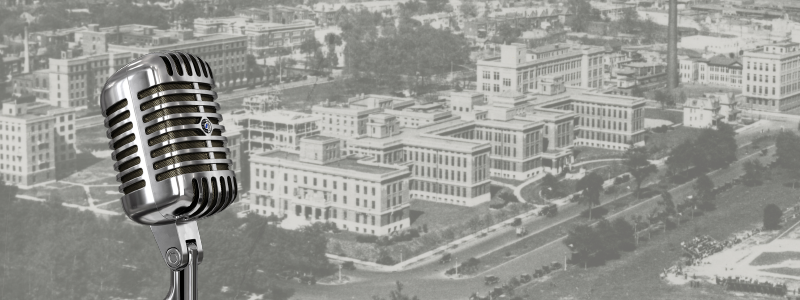
Washington University School of Medicine Oral Histories

Michael M. Karl Oral History
Interviewer
James Carter and William M. Geideman
Loading...
Summary
Michael M. Karl was interviewed by James Carter and William M. Geideman on July 24, 1990, for approximately 11 minutes. Karl discusses the ways in which hospitals were segregated in St. Louis when he first came to the city in the 1930s, and how the desegregation of Barnes Hospital came about.
Scope and Content
Michael Karl discusses the ways in which hospitals were segregated in St. Louis when he first came to the city in the 1930s, and how the desegregation of Barnes Hospital came about.
Karl begins by addressing the status of segregated medical facilities in St. Louis in the early 1930s and 1940s and then discusses the desegregation of Barnes Hospital and the elimination of the segregated wards for Black patients, Wards 0300 and 0400. He remarks on the role the hospital boards played in preventing the hospital from desegregating, and the similarities and differences between the Black and white wards.
Karl also discusses the high level of medical care for Black patients at Barnes Hospital and some Black physicians who worked at Barnes.
He says he believes Barnes was integrated in 1962, however the exact date when the hospital was fully integrated is not known.
Biographical Information: Interviewee
Michael M. Karl (1915-2006) was born in 1915 in Milwaukee, Wisconsin and received his M.D. from the University of Louisville in 1938. Karl joined the faculty of Washington University's department of medicine in 1941, where he was widely viewed as an outstanding teacher. He was named director of clinical affairs in the Department of Medicine in 1987. He was also a member of the clinical faculty at Barnes Hospital and in the early 1960s he successfully led the movement to eliminate the all-Black wards, 0300 and 0400.
Karl was one of few general internists to become a member of the Institute of Medicine of the National Academy of Sciences. He was a master of the American College of Physicians (ACP), governor of the ACP for the State of Missouri and received the ACP Laureate Award in 1988.
President Jimmy Carter appointed Karl to the national advisory committee of the White House Conference on the Family from 1978-1980, where he was among the first to call for family leave protections for working parents. He also worked for the establishment of national health insurance for all people regardless of their capacity to pay. In St. Louis, he was the co-organizer of one of the first health services for the poor, the Jeff-Vander-Lou Medical Clinic.
Biographical Information: Interviewer
James Carter is an anesthesiologist who received his bachelor's from Washington University in 1989 and graduated from Washington University School of Medicine in 1993.
William M. Geideman is an orthopedic surgeon who graduated from Washington University School of Medicine in 1993. He completed his internship and orthopedic residency training at Barnes-Jewish Hospital.
Interview Date
1990-07-24
Collection Identifier
OH106 (PC054-S08)
Length
Approximately 11 minutes.
Restrictions
Users wishing to publish (in whole, or in part) content taken from the audio or transcript of this oral history interview must request, sign, and return a Statement of Use form to the Becker Archives. For detailed information regarding publication and use of this oral history, contact the Becker Archives (arb@wusm.wustl.edu).
Recommended Citation
Michael M. Karl Oral History, OH106 (PC054-S08), Bernard Becker Medical Library Archives, Washington University in St. Louis.
Disclaimer
The Becker Archives provides access to this oral history interview as a record of the past. This interview reflects the attitudes, perspectives, and beliefs of the interview participants, which may reflect outdated, biased, and offensive views and opinions. The Becker Archives does not endorse the views expressed in this interview, which may contain materials offensive to some users.



